Hydraulic Fracturing: Exploring the Environmental and Economic Effects
VerifiedAdded on 2022/08/27
|5
|1767
|13
Essay
AI Summary
This essay provides a comprehensive overview of hydraulic fracturing, examining its role in oil and gas extraction and its significant environmental consequences. The essay begins by highlighting the importance of knowledge in understanding the science and technology behind fracking. It then delves into the process of hydraulic fracturing, explaining how high-pressure injections of water, sand, and chemicals create fractures in bedrock to release oil and natural gas. The essay discusses both the advantages, such as access to alternative resources and potentially lower energy costs, and the disadvantages, including high water usage and the presence of hazardous chemicals. It also explores the environmental impacts, focusing on air, water, and soil pollution, including methane emissions and water contamination. The essay references regulations and policies in the United States and concludes with a call for more precise standards to mitigate the negative impacts of fracking. The essay emphasizes the need for research into alternative extraction processes to balance the benefits of oil and gas with environmental protection.
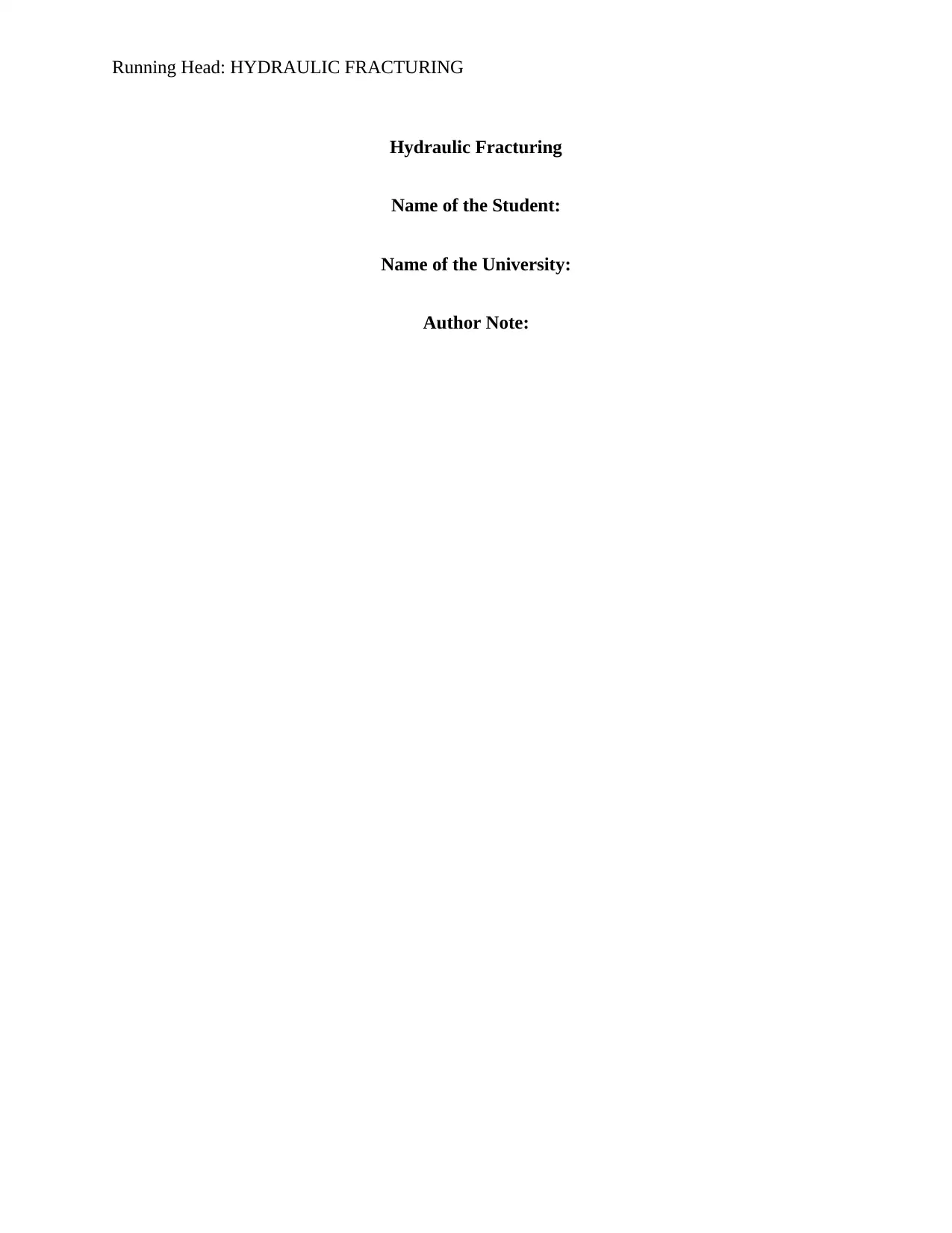
Running Head: HYDRAULIC FRACTURING
Hydraulic Fracturing
Name of the Student:
Name of the University:
Author Note:
Hydraulic Fracturing
Name of the Student:
Name of the University:
Author Note:
Paraphrase This Document
Need a fresh take? Get an instant paraphrase of this document with our AI Paraphraser
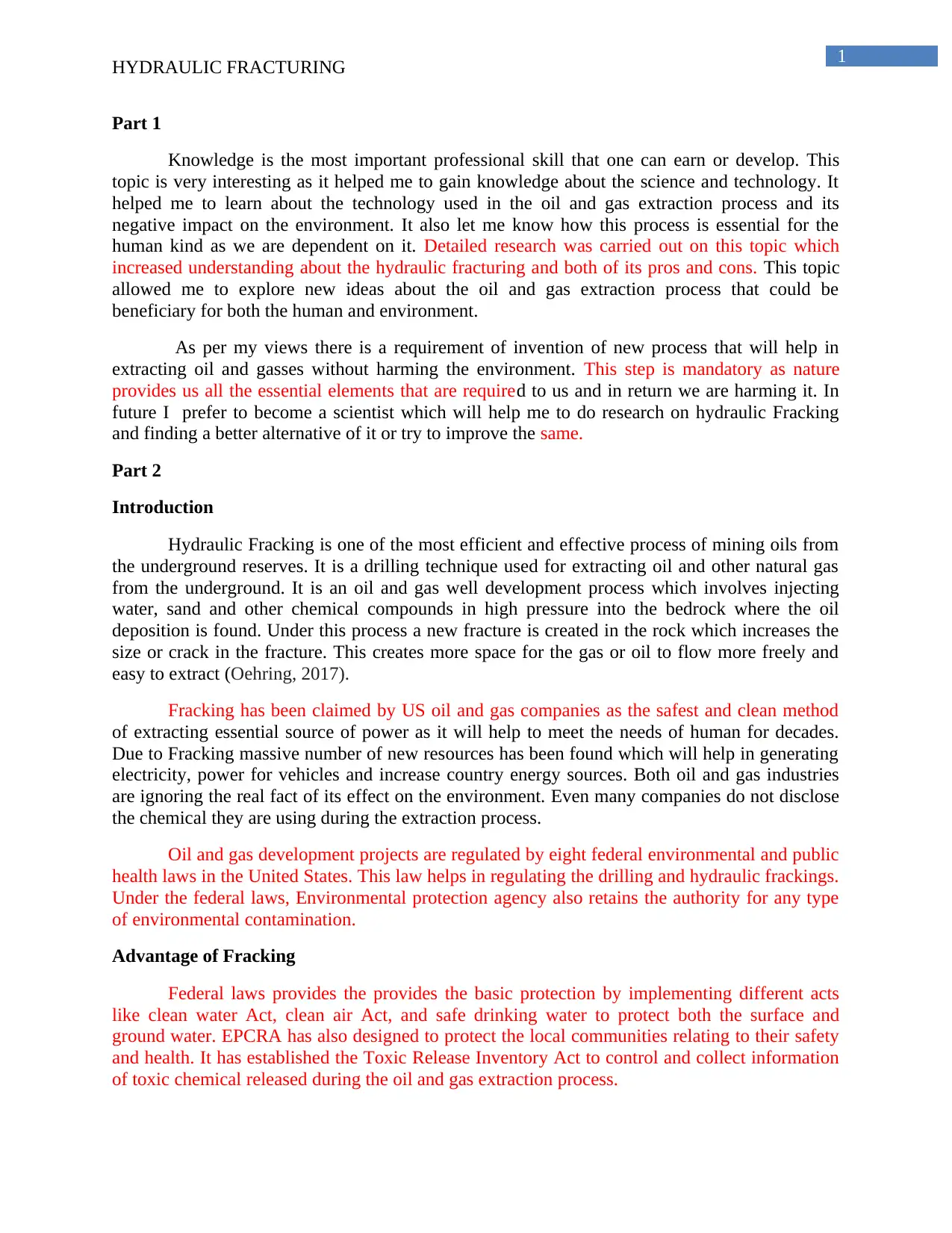
1
HYDRAULIC FRACTURING
Part 1
Knowledge is the most important professional skill that one can earn or develop. This
topic is very interesting as it helped me to gain knowledge about the science and technology. It
helped me to learn about the technology used in the oil and gas extraction process and its
negative impact on the environment. It also let me know how this process is essential for the
human kind as we are dependent on it. Detailed research was carried out on this topic which
increased understanding about the hydraulic fracturing and both of its pros and cons. This topic
allowed me to explore new ideas about the oil and gas extraction process that could be
beneficiary for both the human and environment.
As per my views there is a requirement of invention of new process that will help in
extracting oil and gasses without harming the environment. This step is mandatory as nature
provides us all the essential elements that are required to us and in return we are harming it. In
future I prefer to become a scientist which will help me to do research on hydraulic Fracking
and finding a better alternative of it or try to improve the same.
Part 2
Introduction
Hydraulic Fracking is one of the most efficient and effective process of mining oils from
the underground reserves. It is a drilling technique used for extracting oil and other natural gas
from the underground. It is an oil and gas well development process which involves injecting
water, sand and other chemical compounds in high pressure into the bedrock where the oil
deposition is found. Under this process a new fracture is created in the rock which increases the
size or crack in the fracture. This creates more space for the gas or oil to flow more freely and
easy to extract (Oehring, 2017).
Fracking has been claimed by US oil and gas companies as the safest and clean method
of extracting essential source of power as it will help to meet the needs of human for decades.
Due to Fracking massive number of new resources has been found which will help in generating
electricity, power for vehicles and increase country energy sources. Both oil and gas industries
are ignoring the real fact of its effect on the environment. Even many companies do not disclose
the chemical they are using during the extraction process.
Oil and gas development projects are regulated by eight federal environmental and public
health laws in the United States. This law helps in regulating the drilling and hydraulic frackings.
Under the federal laws, Environmental protection agency also retains the authority for any type
of environmental contamination.
Advantage of Fracking
Federal laws provides the provides the basic protection by implementing different acts
like clean water Act, clean air Act, and safe drinking water to protect both the surface and
ground water. EPCRA has also designed to protect the local communities relating to their safety
and health. It has established the Toxic Release Inventory Act to control and collect information
of toxic chemical released during the oil and gas extraction process.
HYDRAULIC FRACTURING
Part 1
Knowledge is the most important professional skill that one can earn or develop. This
topic is very interesting as it helped me to gain knowledge about the science and technology. It
helped me to learn about the technology used in the oil and gas extraction process and its
negative impact on the environment. It also let me know how this process is essential for the
human kind as we are dependent on it. Detailed research was carried out on this topic which
increased understanding about the hydraulic fracturing and both of its pros and cons. This topic
allowed me to explore new ideas about the oil and gas extraction process that could be
beneficiary for both the human and environment.
As per my views there is a requirement of invention of new process that will help in
extracting oil and gasses without harming the environment. This step is mandatory as nature
provides us all the essential elements that are required to us and in return we are harming it. In
future I prefer to become a scientist which will help me to do research on hydraulic Fracking
and finding a better alternative of it or try to improve the same.
Part 2
Introduction
Hydraulic Fracking is one of the most efficient and effective process of mining oils from
the underground reserves. It is a drilling technique used for extracting oil and other natural gas
from the underground. It is an oil and gas well development process which involves injecting
water, sand and other chemical compounds in high pressure into the bedrock where the oil
deposition is found. Under this process a new fracture is created in the rock which increases the
size or crack in the fracture. This creates more space for the gas or oil to flow more freely and
easy to extract (Oehring, 2017).
Fracking has been claimed by US oil and gas companies as the safest and clean method
of extracting essential source of power as it will help to meet the needs of human for decades.
Due to Fracking massive number of new resources has been found which will help in generating
electricity, power for vehicles and increase country energy sources. Both oil and gas industries
are ignoring the real fact of its effect on the environment. Even many companies do not disclose
the chemical they are using during the extraction process.
Oil and gas development projects are regulated by eight federal environmental and public
health laws in the United States. This law helps in regulating the drilling and hydraulic frackings.
Under the federal laws, Environmental protection agency also retains the authority for any type
of environmental contamination.
Advantage of Fracking
Federal laws provides the provides the basic protection by implementing different acts
like clean water Act, clean air Act, and safe drinking water to protect both the surface and
ground water. EPCRA has also designed to protect the local communities relating to their safety
and health. It has established the Toxic Release Inventory Act to control and collect information
of toxic chemical released during the oil and gas extraction process.
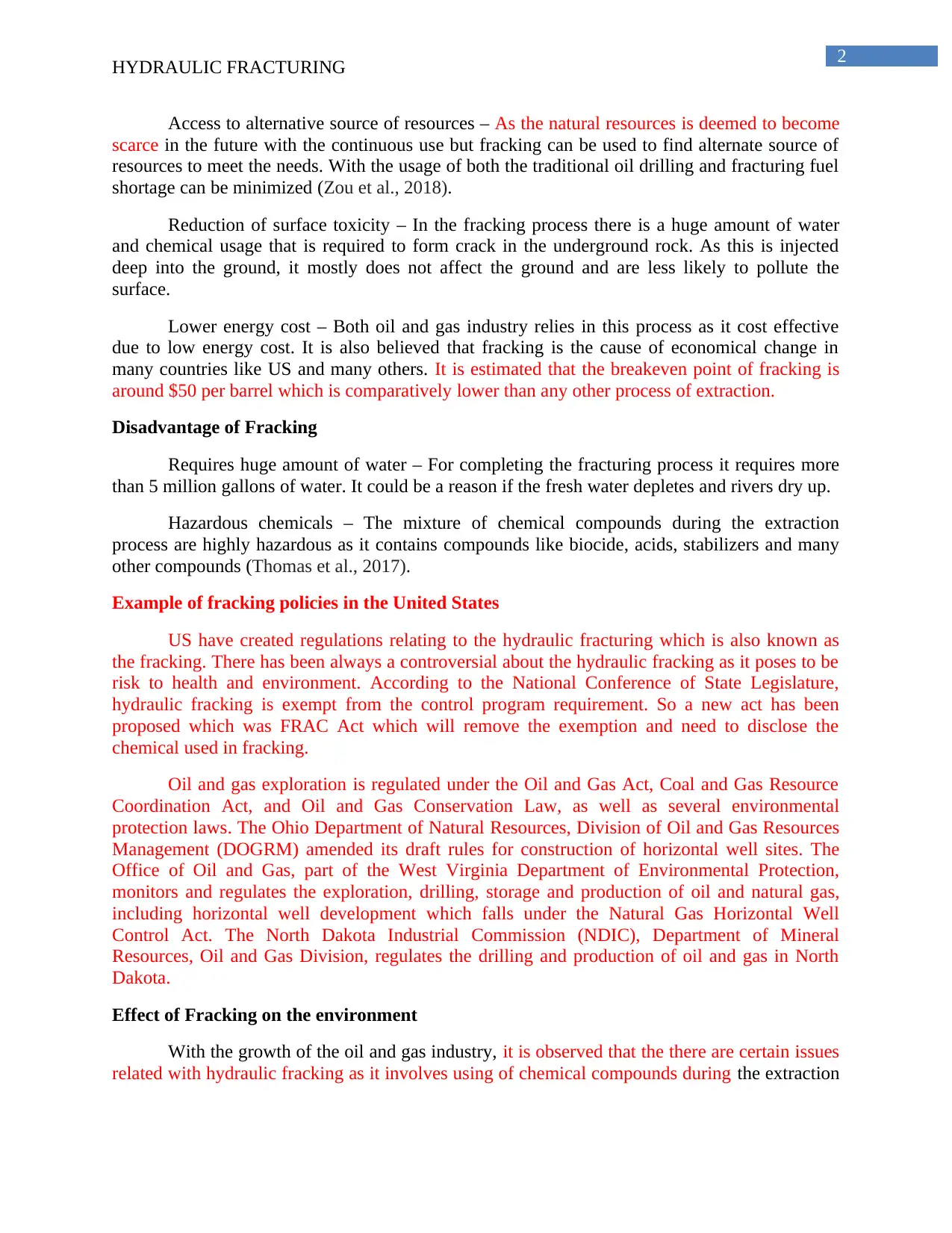
2
HYDRAULIC FRACTURING
Access to alternative source of resources – As the natural resources is deemed to become
scarce in the future with the continuous use but fracking can be used to find alternate source of
resources to meet the needs. With the usage of both the traditional oil drilling and fracturing fuel
shortage can be minimized (Zou et al., 2018).
Reduction of surface toxicity – In the fracking process there is a huge amount of water
and chemical usage that is required to form crack in the underground rock. As this is injected
deep into the ground, it mostly does not affect the ground and are less likely to pollute the
surface.
Lower energy cost – Both oil and gas industry relies in this process as it cost effective
due to low energy cost. It is also believed that fracking is the cause of economical change in
many countries like US and many others. It is estimated that the breakeven point of fracking is
around $50 per barrel which is comparatively lower than any other process of extraction.
Disadvantage of Fracking
Requires huge amount of water – For completing the fracturing process it requires more
than 5 million gallons of water. It could be a reason if the fresh water depletes and rivers dry up.
Hazardous chemicals – The mixture of chemical compounds during the extraction
process are highly hazardous as it contains compounds like biocide, acids, stabilizers and many
other compounds (Thomas et al., 2017).
Example of fracking policies in the United States
US have created regulations relating to the hydraulic fracturing which is also known as
the fracking. There has been always a controversial about the hydraulic fracking as it poses to be
risk to health and environment. According to the National Conference of State Legislature,
hydraulic fracking is exempt from the control program requirement. So a new act has been
proposed which was FRAC Act which will remove the exemption and need to disclose the
chemical used in fracking.
Oil and gas exploration is regulated under the Oil and Gas Act, Coal and Gas Resource
Coordination Act, and Oil and Gas Conservation Law, as well as several environmental
protection laws. The Ohio Department of Natural Resources, Division of Oil and Gas Resources
Management (DOGRM) amended its draft rules for construction of horizontal well sites. The
Office of Oil and Gas, part of the West Virginia Department of Environmental Protection,
monitors and regulates the exploration, drilling, storage and production of oil and natural gas,
including horizontal well development which falls under the Natural Gas Horizontal Well
Control Act. The North Dakota Industrial Commission (NDIC), Department of Mineral
Resources, Oil and Gas Division, regulates the drilling and production of oil and gas in North
Dakota.
Effect of Fracking on the environment
With the growth of the oil and gas industry, it is observed that the there are certain issues
related with hydraulic fracking as it involves using of chemical compounds during the extraction
HYDRAULIC FRACTURING
Access to alternative source of resources – As the natural resources is deemed to become
scarce in the future with the continuous use but fracking can be used to find alternate source of
resources to meet the needs. With the usage of both the traditional oil drilling and fracturing fuel
shortage can be minimized (Zou et al., 2018).
Reduction of surface toxicity – In the fracking process there is a huge amount of water
and chemical usage that is required to form crack in the underground rock. As this is injected
deep into the ground, it mostly does not affect the ground and are less likely to pollute the
surface.
Lower energy cost – Both oil and gas industry relies in this process as it cost effective
due to low energy cost. It is also believed that fracking is the cause of economical change in
many countries like US and many others. It is estimated that the breakeven point of fracking is
around $50 per barrel which is comparatively lower than any other process of extraction.
Disadvantage of Fracking
Requires huge amount of water – For completing the fracturing process it requires more
than 5 million gallons of water. It could be a reason if the fresh water depletes and rivers dry up.
Hazardous chemicals – The mixture of chemical compounds during the extraction
process are highly hazardous as it contains compounds like biocide, acids, stabilizers and many
other compounds (Thomas et al., 2017).
Example of fracking policies in the United States
US have created regulations relating to the hydraulic fracturing which is also known as
the fracking. There has been always a controversial about the hydraulic fracking as it poses to be
risk to health and environment. According to the National Conference of State Legislature,
hydraulic fracking is exempt from the control program requirement. So a new act has been
proposed which was FRAC Act which will remove the exemption and need to disclose the
chemical used in fracking.
Oil and gas exploration is regulated under the Oil and Gas Act, Coal and Gas Resource
Coordination Act, and Oil and Gas Conservation Law, as well as several environmental
protection laws. The Ohio Department of Natural Resources, Division of Oil and Gas Resources
Management (DOGRM) amended its draft rules for construction of horizontal well sites. The
Office of Oil and Gas, part of the West Virginia Department of Environmental Protection,
monitors and regulates the exploration, drilling, storage and production of oil and natural gas,
including horizontal well development which falls under the Natural Gas Horizontal Well
Control Act. The North Dakota Industrial Commission (NDIC), Department of Mineral
Resources, Oil and Gas Division, regulates the drilling and production of oil and gas in North
Dakota.
Effect of Fracking on the environment
With the growth of the oil and gas industry, it is observed that the there are certain issues
related with hydraulic fracking as it involves using of chemical compounds during the extraction
⊘ This is a preview!⊘
Do you want full access?
Subscribe today to unlock all pages.

Trusted by 1+ million students worldwide
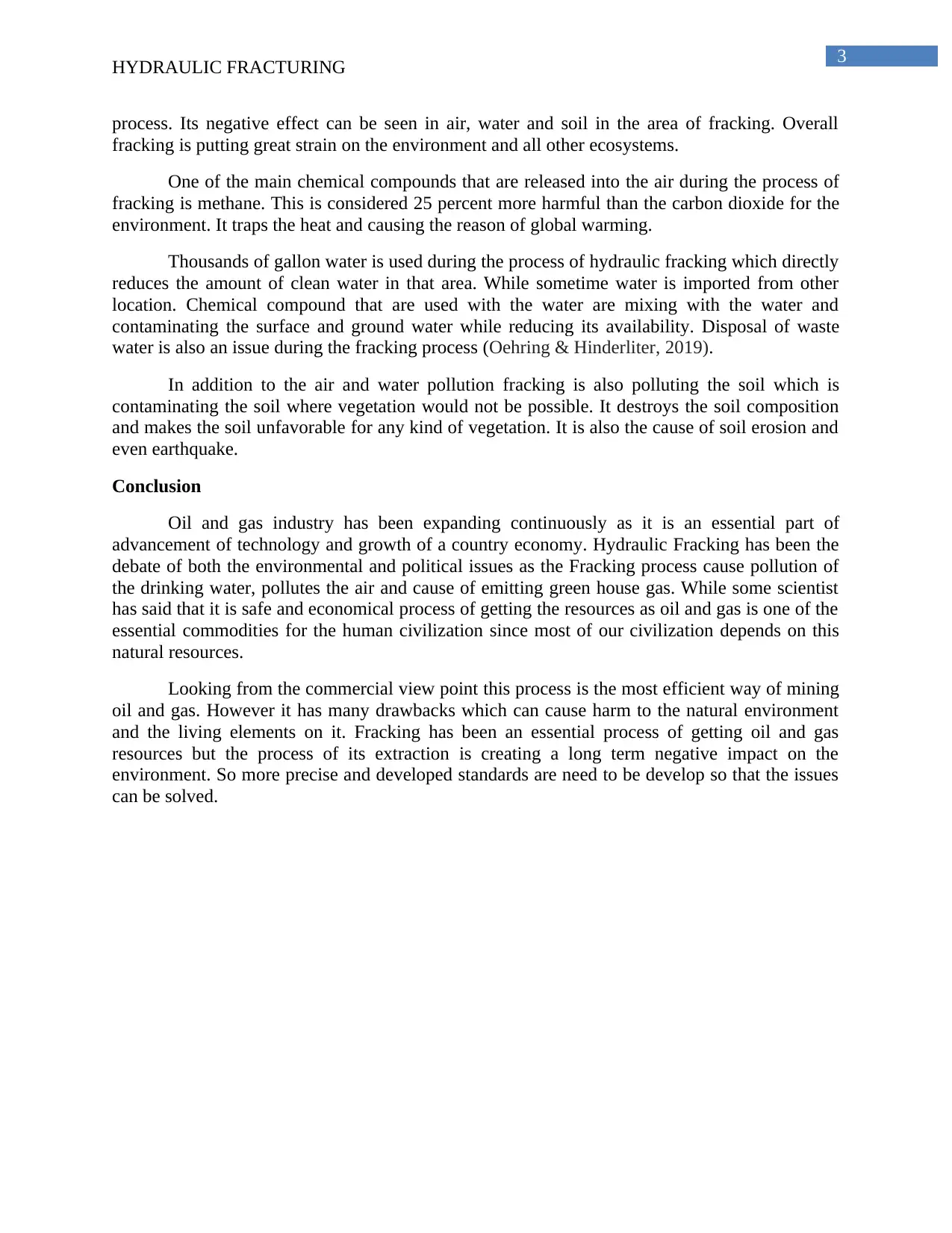
3
HYDRAULIC FRACTURING
process. Its negative effect can be seen in air, water and soil in the area of fracking. Overall
fracking is putting great strain on the environment and all other ecosystems.
One of the main chemical compounds that are released into the air during the process of
fracking is methane. This is considered 25 percent more harmful than the carbon dioxide for the
environment. It traps the heat and causing the reason of global warming.
Thousands of gallon water is used during the process of hydraulic fracking which directly
reduces the amount of clean water in that area. While sometime water is imported from other
location. Chemical compound that are used with the water are mixing with the water and
contaminating the surface and ground water while reducing its availability. Disposal of waste
water is also an issue during the fracking process (Oehring & Hinderliter, 2019).
In addition to the air and water pollution fracking is also polluting the soil which is
contaminating the soil where vegetation would not be possible. It destroys the soil composition
and makes the soil unfavorable for any kind of vegetation. It is also the cause of soil erosion and
even earthquake.
Conclusion
Oil and gas industry has been expanding continuously as it is an essential part of
advancement of technology and growth of a country economy. Hydraulic Fracking has been the
debate of both the environmental and political issues as the Fracking process cause pollution of
the drinking water, pollutes the air and cause of emitting green house gas. While some scientist
has said that it is safe and economical process of getting the resources as oil and gas is one of the
essential commodities for the human civilization since most of our civilization depends on this
natural resources.
Looking from the commercial view point this process is the most efficient way of mining
oil and gas. However it has many drawbacks which can cause harm to the natural environment
and the living elements on it. Fracking has been an essential process of getting oil and gas
resources but the process of its extraction is creating a long term negative impact on the
environment. So more precise and developed standards are need to be develop so that the issues
can be solved.
HYDRAULIC FRACTURING
process. Its negative effect can be seen in air, water and soil in the area of fracking. Overall
fracking is putting great strain on the environment and all other ecosystems.
One of the main chemical compounds that are released into the air during the process of
fracking is methane. This is considered 25 percent more harmful than the carbon dioxide for the
environment. It traps the heat and causing the reason of global warming.
Thousands of gallon water is used during the process of hydraulic fracking which directly
reduces the amount of clean water in that area. While sometime water is imported from other
location. Chemical compound that are used with the water are mixing with the water and
contaminating the surface and ground water while reducing its availability. Disposal of waste
water is also an issue during the fracking process (Oehring & Hinderliter, 2019).
In addition to the air and water pollution fracking is also polluting the soil which is
contaminating the soil where vegetation would not be possible. It destroys the soil composition
and makes the soil unfavorable for any kind of vegetation. It is also the cause of soil erosion and
even earthquake.
Conclusion
Oil and gas industry has been expanding continuously as it is an essential part of
advancement of technology and growth of a country economy. Hydraulic Fracking has been the
debate of both the environmental and political issues as the Fracking process cause pollution of
the drinking water, pollutes the air and cause of emitting green house gas. While some scientist
has said that it is safe and economical process of getting the resources as oil and gas is one of the
essential commodities for the human civilization since most of our civilization depends on this
natural resources.
Looking from the commercial view point this process is the most efficient way of mining
oil and gas. However it has many drawbacks which can cause harm to the natural environment
and the living elements on it. Fracking has been an essential process of getting oil and gas
resources but the process of its extraction is creating a long term negative impact on the
environment. So more precise and developed standards are need to be develop so that the issues
can be solved.
Paraphrase This Document
Need a fresh take? Get an instant paraphrase of this document with our AI Paraphraser
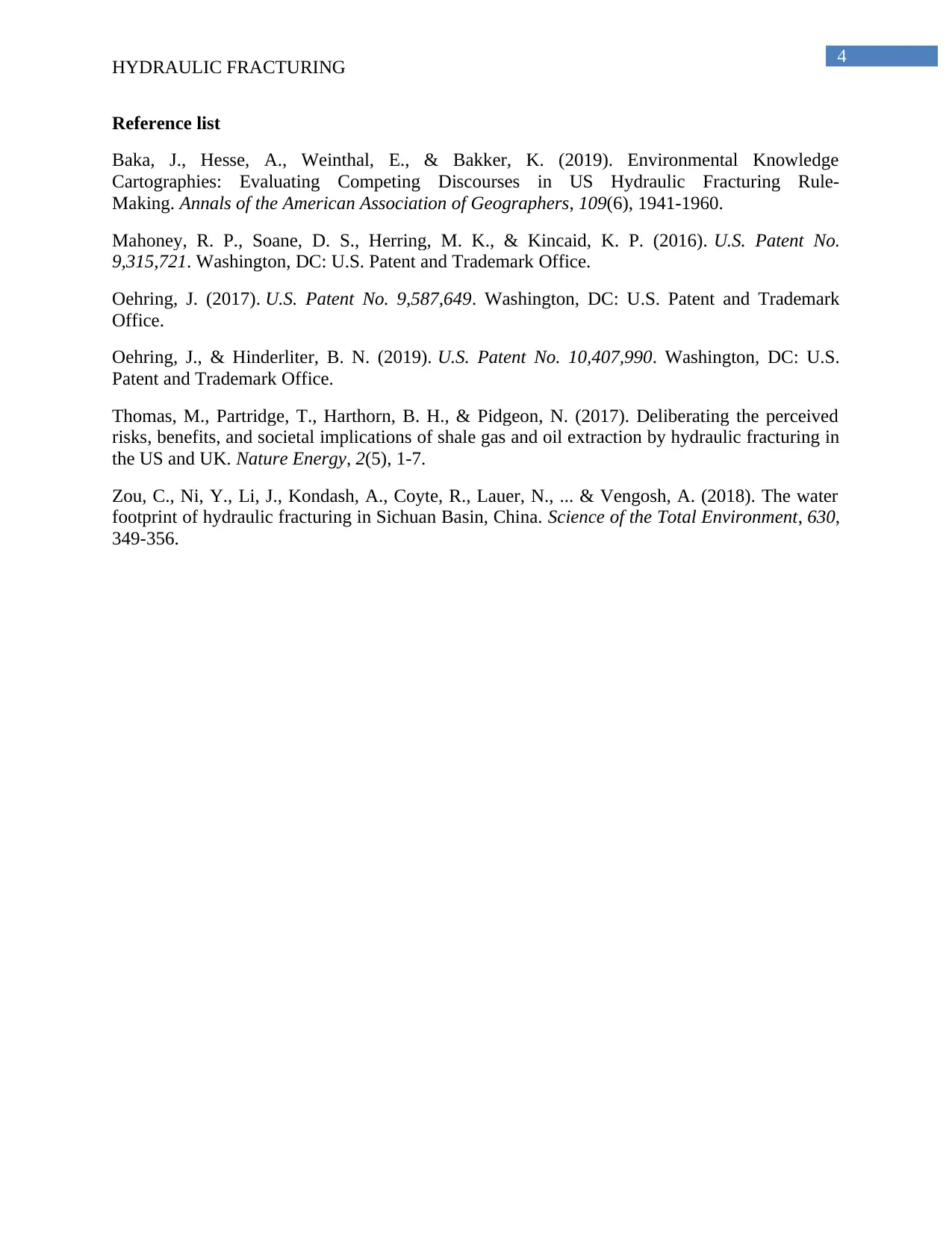
4
HYDRAULIC FRACTURING
Reference list
Baka, J., Hesse, A., Weinthal, E., & Bakker, K. (2019). Environmental Knowledge
Cartographies: Evaluating Competing Discourses in US Hydraulic Fracturing Rule-
Making. Annals of the American Association of Geographers, 109(6), 1941-1960.
Mahoney, R. P., Soane, D. S., Herring, M. K., & Kincaid, K. P. (2016). U.S. Patent No.
9,315,721. Washington, DC: U.S. Patent and Trademark Office.
Oehring, J. (2017). U.S. Patent No. 9,587,649. Washington, DC: U.S. Patent and Trademark
Office.
Oehring, J., & Hinderliter, B. N. (2019). U.S. Patent No. 10,407,990. Washington, DC: U.S.
Patent and Trademark Office.
Thomas, M., Partridge, T., Harthorn, B. H., & Pidgeon, N. (2017). Deliberating the perceived
risks, benefits, and societal implications of shale gas and oil extraction by hydraulic fracturing in
the US and UK. Nature Energy, 2(5), 1-7.
Zou, C., Ni, Y., Li, J., Kondash, A., Coyte, R., Lauer, N., ... & Vengosh, A. (2018). The water
footprint of hydraulic fracturing in Sichuan Basin, China. Science of the Total Environment, 630,
349-356.
HYDRAULIC FRACTURING
Reference list
Baka, J., Hesse, A., Weinthal, E., & Bakker, K. (2019). Environmental Knowledge
Cartographies: Evaluating Competing Discourses in US Hydraulic Fracturing Rule-
Making. Annals of the American Association of Geographers, 109(6), 1941-1960.
Mahoney, R. P., Soane, D. S., Herring, M. K., & Kincaid, K. P. (2016). U.S. Patent No.
9,315,721. Washington, DC: U.S. Patent and Trademark Office.
Oehring, J. (2017). U.S. Patent No. 9,587,649. Washington, DC: U.S. Patent and Trademark
Office.
Oehring, J., & Hinderliter, B. N. (2019). U.S. Patent No. 10,407,990. Washington, DC: U.S.
Patent and Trademark Office.
Thomas, M., Partridge, T., Harthorn, B. H., & Pidgeon, N. (2017). Deliberating the perceived
risks, benefits, and societal implications of shale gas and oil extraction by hydraulic fracturing in
the US and UK. Nature Energy, 2(5), 1-7.
Zou, C., Ni, Y., Li, J., Kondash, A., Coyte, R., Lauer, N., ... & Vengosh, A. (2018). The water
footprint of hydraulic fracturing in Sichuan Basin, China. Science of the Total Environment, 630,
349-356.
1 out of 5
Related Documents
Your All-in-One AI-Powered Toolkit for Academic Success.
+13062052269
info@desklib.com
Available 24*7 on WhatsApp / Email
![[object Object]](/_next/static/media/star-bottom.7253800d.svg)
Unlock your academic potential
Copyright © 2020–2026 A2Z Services. All Rights Reserved. Developed and managed by ZUCOL.





